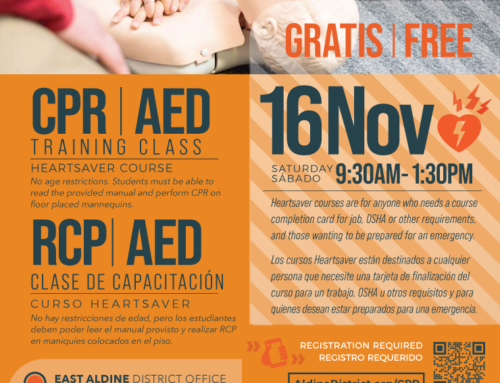By Christina Autry
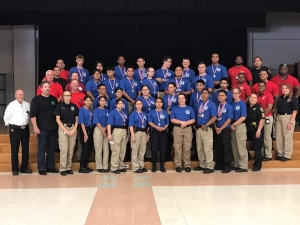 Active shooters. Domestic disturbances. Robberies in progress. DWI’s. Are the new Explorer trainees up for the challenge of dealing professionally with these (admittedly staged) scenarios? Speaking with Sergeant Terry Garza, Deputy David Hernandez and Brian Burks of the East Aldine District, we discussed the Harris County Sheriff’s Office Explorer Program which trains students on how to deal with these real-life, precarious situations from the perspective of an officer.
Active shooters. Domestic disturbances. Robberies in progress. DWI’s. Are the new Explorer trainees up for the challenge of dealing professionally with these (admittedly staged) scenarios? Speaking with Sergeant Terry Garza, Deputy David Hernandez and Brian Burks of the East Aldine District, we discussed the Harris County Sheriff’s Office Explorer Program which trains students on how to deal with these real-life, precarious situations from the perspective of an officer.
Deputy Hernandez and Sergeant Garza teach and run the East Aldine program, one of many sites offering the year-round Explorer Program in the Houston area. Students aged 14-21 who are either interested in a career in law enforcement or simply want to benefit from the program may sign up for these evening classes. “We don’t water down the trainings at all,” says Sergeant Garza. “We let the students experience exactly what it’s like to be a police officer.”
The Explorers Program is a nationwide initiative which began in the 80’s, and was established in East Aldine in 2011. The East Aldine District is proud to support the Explorer’s Program and maintain a strong relationship with the Harris County Sheriff’s Office. “The district board feels that supporting this program is a direct investment they can make in the community,” says Burks. “They really appreciate all of the labor, hours and commitment the officers put into this program for the sake of the kids,” he continues.
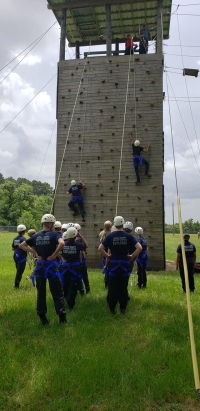 Explorer participants in the Aldine area gather at Baker Ripley on Wednesdays for 3-hour instructional sessions with hands-on training. During these sessions, these approximately 80 students are coached and practice tactics for situations such as bomb searches, crime scene investigations, all kinds of traffic stops, burglaries and much more. Students may remain in the program for as long as they would like, or until they age out at 21.
Explorer participants in the Aldine area gather at Baker Ripley on Wednesdays for 3-hour instructional sessions with hands-on training. During these sessions, these approximately 80 students are coached and practice tactics for situations such as bomb searches, crime scene investigations, all kinds of traffic stops, burglaries and much more. Students may remain in the program for as long as they would like, or until they age out at 21.
“One of our most intense classes is the ‘active shooter’ scenario. Students must work to neutralize the threat. These are very fast paced scenarios; it really gets their adrenaline pumping,” explains Hernandez. “Hostage negotiation is usually their most difficult task. Students have to keep a constant line of communication with their suspect, and it’s easy to run out of things to say. We practice that one a lot,” adds Garza.
Working effectively under pressure, while staying disciplined and calm is a skill that will serve students well no matter the career they pursue. “They will have a huge head start if they do decide to go into law enforcement,” says Garza. Explorers are taught leadership and communication skills and expected to demonstrate them throughout the program. “Many of our Explorers who have ended up joining our department have greatly excelled, and even have gone into special units very quickly,” Garza points out.
Brought to Houston by former Sheriff Adrian Garcia, the Explorer program was intended to be an excellent recruitment method for the Harris County Sheriff’s Office. The program has since then exceeded expectations. “Officers who have gone through this training say it helped them a great deal, especially in the Academy. This is one of the best internships,” Garza says, after seeing how the program has affected the lives of the students as well as the community.
Explorers reap the rewards of the program by pushing themselves to the limit mentally and physically through exercise and instruction. Garza and Hernandez see new recruits quickly realize that working in law enforcement is no easy job. They learn that college-level coursework is required, in addition to the daily stress and necessity to think on your feet at all times. “Even if a kid doesn’t end up going into law enforcement, they still go into the world as an ambassador and advocate for law enforcement, because they’ve seen what it’s like,” says Burks.
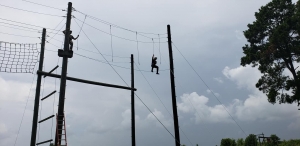 Not only do Explorers participate in training and instructional sessions, but they dedicate time for giving back to the community as well. From park cleanups, to volunteering at senior living centers, at sporting events and parades, or helping with events put on by the police department, you’ll see Explorers active in the city. “This allows them the opportunity to interact with the public in a way that they normally have not. It develops their communication skills, and benefit from exposure to a variety of cultures and walks of life, while serving and getting the job done,” says Hernandez.
Not only do Explorers participate in training and instructional sessions, but they dedicate time for giving back to the community as well. From park cleanups, to volunteering at senior living centers, at sporting events and parades, or helping with events put on by the police department, you’ll see Explorers active in the city. “This allows them the opportunity to interact with the public in a way that they normally have not. It develops their communication skills, and benefit from exposure to a variety of cultures and walks of life, while serving and getting the job done,” says Hernandez.
Explorers are also given various opportunities to show off the skills that they have learned through competing at a city and national level. One of these avenues is through the annual National Law Enforcement Exploring Conference, in which trainees compete in approximately 30 categories from misdemeanor traffic stops to bomb threats. “They have to dispatch it, if necessary, call for backup, helicopters, canines, or an ambulance, take care of the situation safely and legally, and decide who’s going to jail,” says Garza.
Explorers also get the opportunity to participate in a 40-hour course at the Harris County Sheriff’s Office Training Academy, with Q&A sessions with investigators and special units, history and training courses, access to the cadet’s obstacle course, and even rock climbing and zip lining.
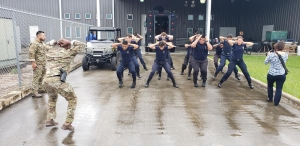 The Greater Houston Area Explorer Training Seminar brings together Explorers from around the city for a week of training, team-building, and competition. “Teaching the kids to work with other agencies will build a comradery amongst the agencies. These friendships and improved communication will benefit everyone in the future,” says Hernandez.
The Greater Houston Area Explorer Training Seminar brings together Explorers from around the city for a week of training, team-building, and competition. “Teaching the kids to work with other agencies will build a comradery amongst the agencies. These friendships and improved communication will benefit everyone in the future,” says Hernandez.
“Working with the kids is what we enjoy most about this program,” both Hernandez and Garza agree. “We see them each grow as a person; their demeanor, and how they carry themselves and become more professional. We’ve seen many shy students come out of their shells and become leaders,” they add.
“They’re all really good kids and they end up making really good police officers, or excelling in other careers,” Burks states. Garza, Hernandez and the other Explorers officers try to keep in touch with graduates of the program and see where their exploration takes them next. Friendships, along with the lessons and experiences they shared in the program, last for many years after trainings are over. Garza recalls being approached by a former Explorer, who told her, “The most fun I’ve had in my life was being an Explorer.”



